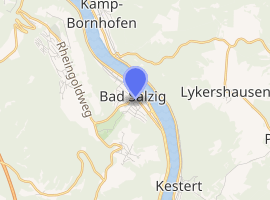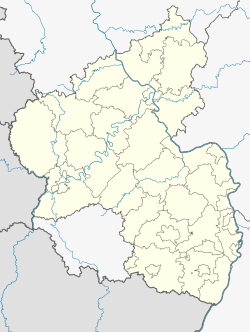Bad Salzig
Bad Salzig is a small town in Rhineland-Palatinate, Germany, on the west bank of the Rhine. It is part of the municipality of Boppard. It is near the city of Koblenz and the Lorelei. It is a spa town, with a spring which dispenses slightly salty water. It is linked to other towns by a railway which runs form the town's railway station.
Bad Salzig | |
|---|---|
Ortsteil of Boppard | |
 | |
 Coat of arms | |
Location of Bad Salzig 
| |
 Bad Salzig  Bad Salzig | |
| Coordinates: 50°12′18″N 7°37′59″E | |
| Country | Germany |
| State | Rhineland-Palatinate |
| District | Rhein-Hunsrück-Kreis |
| Town | Boppard |
| Government | |
| • Local representative | Andreas Nick |
| Area | |
| • Total | 4.2 km2 (1.6 sq mi) |
| Elevation | 80 m (260 ft) |
| Population (31 December 2010) | |
| • Total | 2,589 |
| • Density | 620/km2 (1,600/sq mi) |
| Time zone | CET/CEST (UTC+1/+2) |
| Postal codes | 56154 |
| Dialling codes | 06742 |
| Vehicle registration | SIM |
| Website | |
History
Bad Salzig is located at the historic Roman Rhine road which went from Mainz to Cologne. A Roman index of places from 215 includes a village called Salissone, but it's uncertain whether Salissone is today's Bad Salzig or not. In 1859 two milestones from the third century were found in the river Rhine, which can be seen in the Rheinischen Landesmuseum at Bonn.[1]
During the Thirty Years' War Swedish, French and troops of the Holy Roman Empire occupied Salzig.
In the Nine Years' War troops of Louis XIV conquered Salzig from 1688 to 1689. Moreover, French Revolutionary troops occupied Salzig again and it remained under French control till 1814.
After the Congress of Vienna Salzig was assigned to Prussia.
Notes
- "Official page of Bad Salzig". Archived from the original on 17 October 2007. Retrieved 7 August 2011.